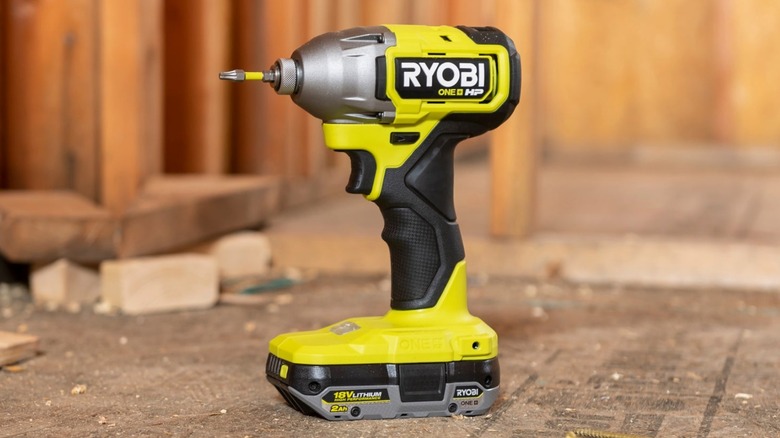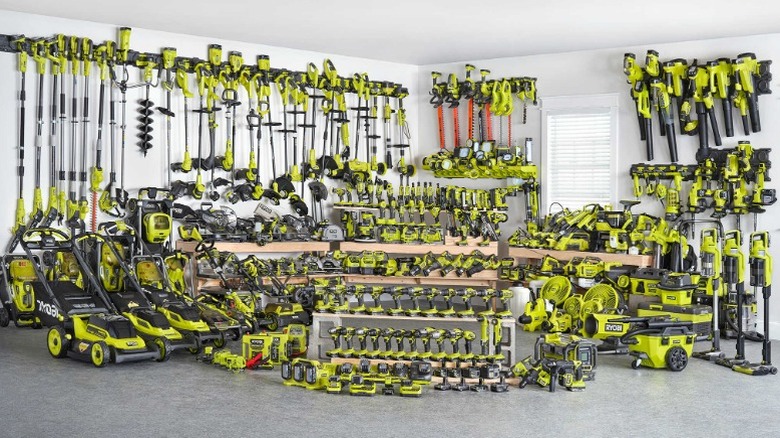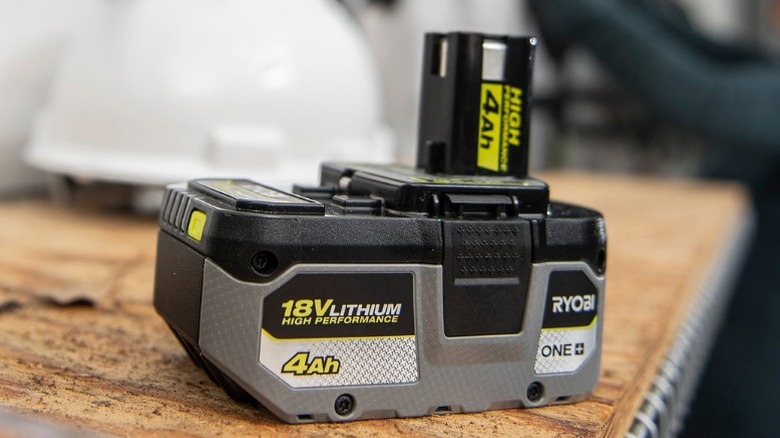Can You Use Ryobi HP Batteries On Non-HP Tools?
Power tool batteries tend to be quite expensive, which makes choosing a single brand and sticking with it a smart financial decision. This is why many power tool collectors consider battery compatibility to be one of the most important considerations that you need to account for when choosing new tools. This even applies to value-oriented brands like Ryobi.
There are a handful of non-Ryobi tools out there that are compatible with the brand's 18V One+ batteries, but these are a bit of an exception to the rule. Batteries aren't typically compatible across brands. In fact, Ryobi produces four different battery systems, which aren't even compatible with each other, despite being from the same brand: USB Lithium, 18V One+, 40V, and 80V. You can't use one of the company's 40V batteries on any of its 18V tools (at least not without heavy, warranty-voiding levels of modification). There are even different kinds of batteries within the same systems, which has led many to wonder if distinct lines in the same voltage system are compatible.
The popular 18V One+ tool system has two separate tool lines with two distinct battery systems. There are the standard 18V tools and batteries, and then there are those that have the special HP (High Performance) designation. This might understandably lead some wary buyers to question whether the Ryobi HP batteries are compatible with non-HP tools. The short answer is that they are compatible, but there is a bit more nuance to it than that. While HP batteries are fully capable of powering any tool of the same voltage within the Ryobi brand, you might not be able to take advantage of all the line's more advanced capabilities if you use an HP battery in a non-HP tool.
Ryobi HP batteries work in non-HP tools
Those who already have a sizable collection of basic Ryobi products will be relieved to learn that all 18V One+ batteries fit all 18V One+ tools, regardless of whether or not they are part of the High Performance line. These newer One+ batteries will even work with older Ryobi tools that were designed before the company switched from NiCad to lithium-ion cores. Many fans consider this wide range of cross-compatibility within the voltage range to be one of the most appealing aspects of the One+ line. It's often touted as one of the company's primary marketing points for why Ryobi users should choose its tools over other brands.
"The key to the ONE+ System is our 18V lithium-ion batteries," Ryobi states. "This advanced battery technology provides fade-free power for maximum performance throughout the charge–from start to finish. What's more, all 18V ONE+ batteries work with every RYOBI 18V tool ever made. Great news, because now you can expand your system with confidence knowing that our full lineup is 100% compatible."
Suffice to say, this includes HP batteries being compatible with non-HP tools. You simply need to ensure that they are both part of the same voltage system, and you shouldn't have any trouble firing up whatever tool you choose to use it in. That said, simply being able to power a tool isn't the only thing that the HP One+ batteries were designed for, and most of their other perks require the battery to be paired with a tool from the same line.
Non-HP tools don't get the boost in performance
So, now we've established that compatibility isn't an issue, but there is still a reason why you might prefer to pair the HP batteries with HP tools if possible. Unfortunately, using a Ryobi HP 18V One+ Battery in a non-HP tool doesn't automatically imbue it with the High Performance line's capabilities. The standard tools will still operate the way that they would if you were to pair them with a normal One+ battery.
There are several differences between the Ryobi One+ and Ryobi One+ HP product lines. Most standard Ryobi products have brushed motors, while most of the HP tools have brushless motors. This might not seem like a big difference, but it dramatically reduces the friction inside the motor. This, in turn, lowers heat generation, extends battery life, and prolongs the life of the tool itself. HP tools also tend to offer better specs, with more torque, faster speeds, and more powerful performance when under load, hence the name, High Performance.
But the biggest difference in terms of the HP batteries is the way that they're able to interface with Ryobi's HP tools. Both the HP tools and the HP batteries have smart components built into them, which allow them to optimize performance while regulating thermals and power draw. This only works when both the tool and the battery are part of the HP line, however. You won't get any of these benefits if you use the HP batteries in non-HP tools.


